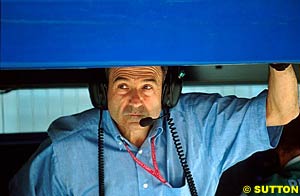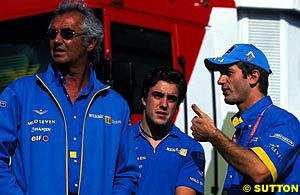
Atlas F1 Columnist
This week's Grapevine brings you |
Having had the chance to test ahead of Christmas, the teams don't have the same urgency to get back on the test track as they showed last year, after the full October and November ban… though it's not all about track time.
In continuing to run Ferrari's customer engines, Sauber have themselves a unit that is almost as powerful as any in the field, and reliable to boot. As much to the point, Ferrari will be supplying them with increments through the season, which will keep that part of the package up to scratch. This lowers ongoing costs on two fronts for the team, as they have no development, and only very limited testing costs associated with the engine. The team is left in a position to concentrate on developing the aerodynamics (the mechanical characteristics are largely fixed by the design) as the season unfolds – until they need to consider the next season, at least.
One thing that might throw a spanner in everyone's works, is what's brewing in the forthcoming meeting the FIA has called with the teams. If, as many suppose, it is intended to force through 'cost cutting measures', recovering from the aftermath is likely to come down, by and large, to the number of hours spent on the test track…
It seems odd that Renault should sign up for Friday testing, alongside the low budget teams of Jordan and Minardi. Enough so that the other midfield teams are having a careful look at them, trying to work out what is going on.
Arguably, Renault's biggest strength in 2002 was a fantastic launch control system that – generally – was worth a couple of places on the grid, even when the drivers were relatively well placed, as the McLarens often discovered to their cost. Ironically, their biggest problem for the year was the engine: although it was smooth, had plenty of torque and was tied into a solid traction control solution, there just wasn't enough power to really threaten any of the big three.
Looking forward, it appears that Renault have targeted 2004 for their next really big engine step, to coincide with the change in regulations, though they are getting ahead on the gearbox stakes, having put together a titanium and carbon unit for this year's car. The 2003 engine is still a good step forward – integration with the chassis has been improved, and the fuel efficiency optimised by more than ten percent. This will let the car start a race with around ten percent less fuel than if it started on the same strategy with the old car… which is clearly good news for the launch control. Power output is up, but still expected to come in 50bhp short of the front runners.
Although Jarno Trulli is showing more maturity in racing, he is still noted for his ability to drive the wheels off the car in qualifying. Fernando Alonso, undoubtedly a talent, has a season racing at Minardi behind him, and another of testing with Renault. Those tests have been an excellent proving ground for him in the team – he is fully integrated in the garage, with his crew respecting his feedback as well as his speed – but they have not offered racing experience. Accordingly, whilst he is expected to perform in qualifying, there are still questions over his performance over the full race distance.
So, with drivers who can qualify strongly, superb launch control, a significantly more efficient engine – opening windows for more inventive race strategies – it seems that Renault are building on their 2002 season by focussing on improving qualifying, then looking to hang on to places
for points as the race unfolds.
The success of this strategy depends on the balance between the advantage of an extra two hours of track time on the weekend, against the loss of testing time throughout the season. Most teams see this move as Renault targeting early points, which carry huge political weight for agreeing budgets for 2004 with the board, before concentrating on the new challenger. If this is the case, then the team's efforts on the 2003 car will not allow them to keep pace with their rivals, and they face the expectation of being overhauled.
If, on the other hand, the team is right, then those two extra hours spent setting up the cars will give them a solid advantage over the midfield, and offer a solid chance of upsetting the apple-cart if any of the big three teams is having a bad weekend.
![]() All Ahead, Slow…
All Ahead, Slow…
 Sauber's new car is threatening to be halfway useful – at least, the budget has let them put one together, and there is enough left in the kitty to pay the drivers and go to the races. The team has confounded critics by not committing to the Friday test schedule from the outset, as they wait to see if they develop the funds to test and develop in the traditional fashion as the season wears on. As it stands, holding off leaves Sauber in a strong position: they can still join the program if the money hasn't materialised by the start of the season.
Sauber's new car is threatening to be halfway useful – at least, the budget has let them put one together, and there is enough left in the kitty to pay the drivers and go to the races. The team has confounded critics by not committing to the Friday test schedule from the outset, as they wait to see if they develop the funds to test and develop in the traditional fashion as the season wears on. As it stands, holding off leaves Sauber in a strong position: they can still join the program if the money hasn't materialised by the start of the season.
![]() Flavour of the Month
Flavour of the Month
 Independently, they have come to pretty similar conclusions about Renault's strategy for the coming year, though they have differing opinions concerning its likelihood of success.
Independently, they have come to pretty similar conclusions about Renault's strategy for the coming year, though they have differing opinions concerning its likelihood of success.
Please Contact Us for permission to republish this or any other material from Atlas F1.
|
Volume 9, Issue 02
Atlas F1 Special
Simply the Best: the Journalist
Simply the Best: the Mechanic
Simply the Best: the Press Officers
Simply the Best: the Authors
Simply the Best: the Artists
Columns
Elsewhere in Racing
The Grapevine
> Homepage |